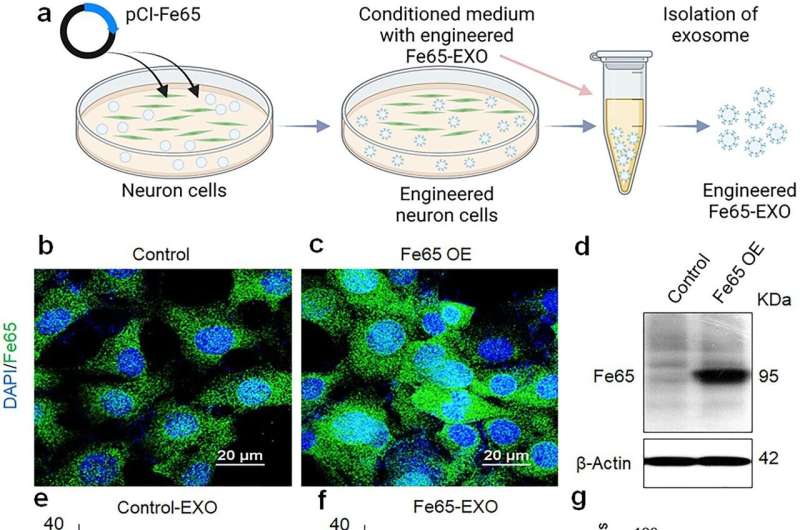This article has been reviewed according to Science X's editorial process and policies. Editors have highlighted the following attributes while ensuring the content's credibility:
fact-checked
trusted source
proofread
Novel drug delivery system developed for Gouteng compound for Alzheimer's disease treatment

A research team led by Hong Kong Baptist University (HKBU) has developed a novel drug delivery system for Alzheimer's disease (AD). The researchers have engineered exosomes, extracellular vesicles released by cells, to effectively carry the bioactive compound Corynoxine-B extracted from the Chinese herbal medicine Gouteng to the brain of mice with AD.
As Corynoxine-B can induce autophagy, a process that maintains the health of cells, this new drug delivery system using exosomes can improve cognitive function and movement while reducing the symptoms of AD. The research findings have been published in the journal Signal Transduction and Targeted Therapy.
Bioactive compound of Gouteng can treat AD
AD is the most common type of dementia in which the brain cells degenerate and die, characterized by a build-up of amyloid-beta and phospho-tau protein in the brain, resulting in the decline of the brain's cognitive functions. Currently more than 55 million people worldwide are dementia patients. In Hong Kong more than 100,000 elderly suffer from dementia and the number is anticipated to soar to more than 330,000 by 2039.
At present there is no curative treatment for AD. Available treatments can only delay the disease's progression and improve symptoms. HKBU's previous research projects found that Corynoxine-B, a bioactive compound of Gouteng, is effective in treating AD. However, the blood-brain barrier which protects the brain from potentially harmful substances in the bloodstream affects its uptake in brain.
Exosomes serve as drug carriers
To tackle this problem, a research team comprising Professor Li Min, Associate Dean (Teaching and Learning) of Chinese Medicine, and Dr. Ashok Iyaswamy, Research Assistant Professor of the Teaching and Research Division at the School of Chinese Medicine at HKBU, along with other local, mainland and overseas scientists, have developed a novel approach to deliver Corynoxine-B to the brain using exosomes.
Exosomes are extracellular vesicles released by cells that can transport molecules between cells like nanocarriers. Recent studies have shown that they could be utilized as vehicles for drug delivery. To examine whether exosomes are effective drug carriers for AD, the researchers manipulated the neuronal cells in mice to overexpress an adaptor protein Fe65 on the surface of exosomes released by these cells. Fe65 is involved in the processing of amyloid-beta precursor protein (APP), which plays a crucial role in the development of AD.
The team observed more exosomes containing Fe65 were released by the neuronal cells. These engineered exosomes showed a strong ability to migrate toward the neuronal cells with APP overexpressed in AD models. These findings suggest that the presence of Fe65 on the surface of exosomes enhanced their ability to specifically target and interact with the neuronal cells with elevated levels of APP, which is a characteristic feature of AD.
Reduction of accumulated amyloid-beta protein
Corynoxine-B is a natural inducer of autophagy which plays a crucial role in maintaining neuronal health. The research team loaded it into the engineered exosomes and injected it to the mice with AD to evaluate its potential as a therapeutic agent for the disease. Results show that engineered exosomes loaded with Corynoxine-B could enhance autophagy in mice, and were able to cross the blood-brain barrier to deliver Corynoxine-B to the brain, resulting in a 30% reduction of accumulated amyloid-beta protein.
In addition, various behavioral tests including the rotarod test, open field test, contextual fear conditioning test, and Morris's water maze test conducted on mice with AD showed that the application of engineered exosomes loaded with Corynoxine-B resulted in 25% recovery of the cognitive and locomotor behavior.
Professor Li Min said, "Our study suggests that exosomes could be a promising new way to deliver drugs to the brain and treat AD. More research is needed, but this study provides hope that a cure for AD may be possible in the future. We hope that this research project will ultimately be beneficial to the elderly, individuals at high risk of neurodegeneration and neurodegenerative disease patients."
More information: Ashok Iyaswamy et al, Fe65-engineered neuronal exosomes encapsulating corynoxine-B ameliorate cognition and pathology of Alzheimer's disease, Signal Transduction and Targeted Therapy (2023). DOI: 10.1038/s41392-023-01657-4



















